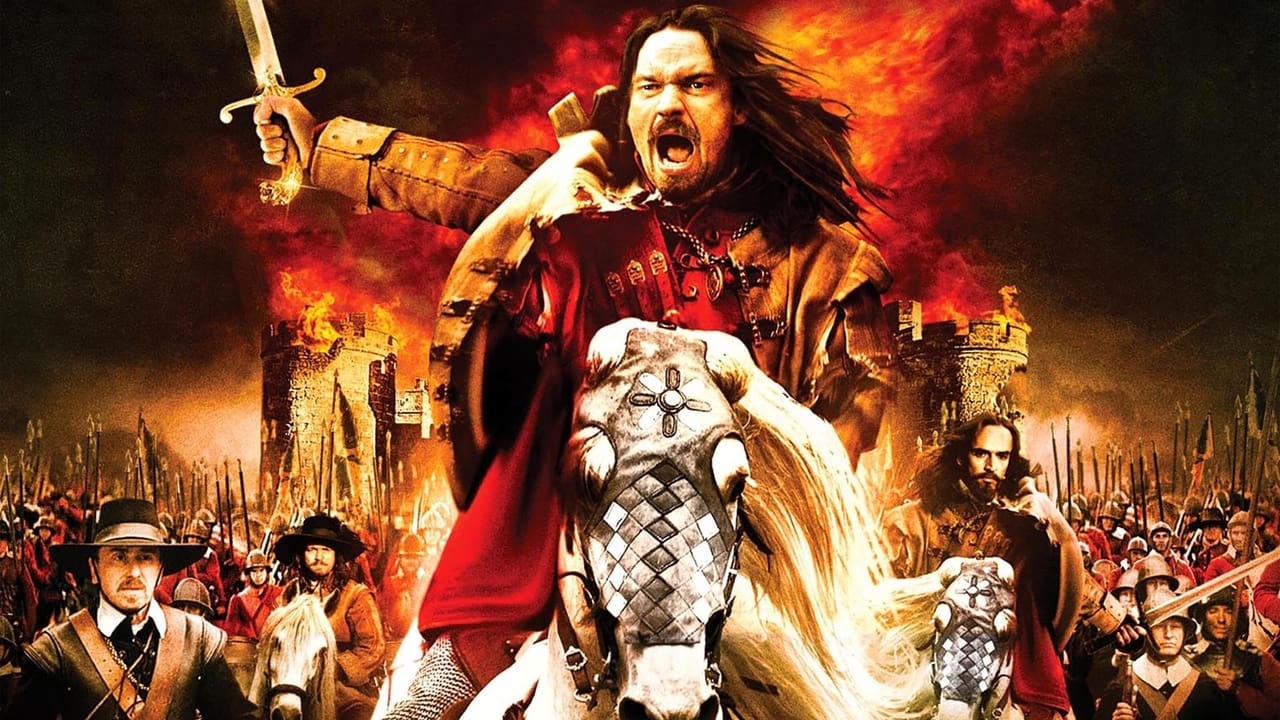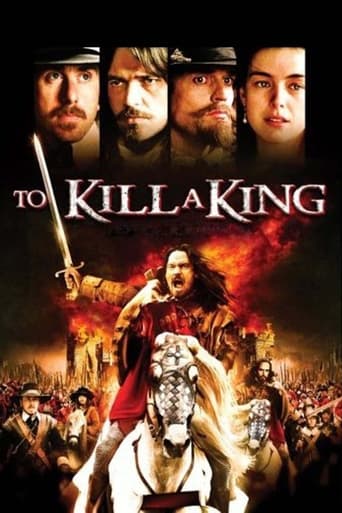

English Civil War events were not very familiar to me, and there are not too many films about it (I remember seeing panoramic Cromwell (1970) some decades ago). The times were hectic, ideas were exuberant, but real life and people's absorption of them was rather shabby. To Kill a King focuses on the relationship between MP / Lord Protector Oliver Cromwell and Sir/General Thomas Fairfax in the post-war period from 1648 until the former's death, in 1658.Although Tim Roth is a fine actor and Dougray Scott seems good actor as well, I felt no profound contradiction or complexity between them; well, their approaches and motives were reasoned, but their depiction was somewhat perfunctory, via uneven course of events, mostly taking place indoors (many exterior or nature scenes provide more faithfulness). Rupert Everett as King Charles I was too reserved as well, female characters and performance were quite uninviting. I felt myself constantly watching a historical half-documentary that could have been helpful before respective exam :) Thus, more thank okay film, but no conceptional work for me... Of I have been spoiled by powerful war and costume dramas...
... View MoreOn first viewing I was not really satisfied with this film. Who could deal with such a vast subject in one film? It was clever to not tackle the whole war but concentrate on a shorter time frame. I have no knowledge of any of the actors except James Bolam. I would not have cast Rupert Everett on looks , height etc but how little that matters . He is really excellent , he uses his eyes to great effect .The King's continued belief that he will be rescued , the British people really do love him are obvious at first . It is the pain and fear in his eyes that really seals it for me .His walk to the block ( being fondled and clawed at by the commoners is obviously repellent and terrifying). There is something about the whole scene that really reflects King Charles's inner faith that this is his second wedding day ,this time to Jesus . Tim Roth plays Cromwell with a touch too many Hitler like stances but he is so much better than Richard Harris. I think many historians do think Cromwell had mental illness. The Govt. by his New Model Army reminds me of The Taliban .I would have been on the side of Parliament but like many English people welcomed back the monarchy after his rule. I have little knowledge of Fairfax but the relationship between the two is worth reading about if this film is anything to go by. The sets are fantastic ,the actual Hampton Court was worth it . I am sure that even Civil War buffs should acknowledge it's intelligence . I only wish the creators could have made a series. Things worth looking out for are the severe uniforms worn at the King's trial ,note a love of buttons ( Cromwell truly was a dictator worthy of Pinochet). The King's absolute lack of understanding the ranting man who made no sense to his perception of his place in the World.The bewilderment of Cromwell that anyone should see things other than his way. If you weren't sure on first viewing give it a second and third chance. I don't see any flirting between Charles 1st and Lady Fairfax b.t.w just a lonely man desperate for company of his class and a woman in awe of the most important man in the country in her eyes.
... View MoreSPOILERSThe problem I had when watching this film is that ultimately I feel a bit naieve. I've been an enourmous history fan for years. If it wasn't for weak grades at A-Levels I could have ended up doing it at University, as it happens though this one time period is one of the few periods I'm very sketchy on. I have no idea what happened during the English Civil War, I just know that I've always been quite royalist and the idea of Oliver Cromwell declaring himself Lord High Protector has always seemed a bit power hungry and wrong to me. As a result, it's hard to really comment on this film."To Kill A King" begins at the end of the Civil War itself with the introduction straight away of Sir Thomas Fairfax (Dougray Scott). Fairfax is the enigmatic leader of the Parliamentarians and alongside him is his puritanical deputy and best friend Oliver Cromwell (Tim Roth). The film covers the two's relationship and traces all the way upto the reintroduction of the Monarchy.Like I said, it's kind of difficult to appreciate this film. As far as period drama's go, it's engrossing and the costumes and set are impressive. Ultimately most people would state that this is enough. The problem though is that when I watch Historical Drama films, I need my historical accuracy. I hated "The Patriot", not just because it was a rubbish film, but especially because Gibson portrayed the English so inaccurately and critically, and whilst "Braveheart" was a million times more entertaining, it was still questionable about certain key events.This film is slated a lot for being Historically inaccurate, if this is the case then yeah I have reason to hold a grudge. The problem is however that like I've said, I don't know what we consider to be "the truth". Should my desire for historical accuracy affect a film? I'd like to say no, but ultimately I just can't help it. This film is an engrossing, intelligent film with a fine cast and amazing cinematography, without a personal knowledge of the history though, I can't really judge it. If you don't care about historical accuracy, watch this film, if you do care, please watch it just so you can tell me how accurate it is.
... View MoreOne of the pivotal events of European history, the English Civil War, is treated with an indifference to reality that surpasses insouciance. The frustrated viewer may be forgiven for concluding either that neither producer nor screenwriter had read anything relevant beyond a short encyclopaedia article or two (though, doubtless, both looked at many an illustration of the time: costumes and sets are largely accurate) or that both deliberately chose to reinforce the stereotypes to which the ignorant subscribe (Parliamentarians were dull, bigotted fools; Royalists were noble and brave; etc., etc., etc.). A thorough waste of time.
... View More